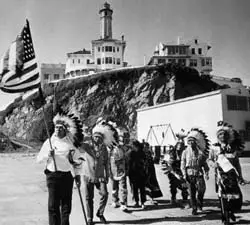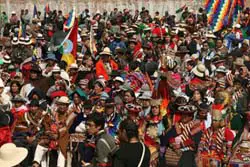Native American Rights
The story of the Native Americans in the United States is one of the most shameless in its history. From the moment the settlers set foot on the soil of the ‘new world’, Native Americans were treated as lesser humans and with disrespect. The plight continued as the country developed, and the Native Americans tried to protect their land and their lifestyle.


Native Americans had existed for thousands of years in various tribes across the country. In some cases they warred among themselves, but most of the time they lived in peace, taking only what they needed from the land. The entrance of the settlers brought about a glut for land and a demand that these people move ever further into other areas.
This continued through the expansion into the West as tribes fought valiantly to maintain a hold and keep their lands clean and free. The final insults occurred when the U.S. Government decided to relocate tribes of Native Americans, most on foot, hundreds of miles away to new ‘reservations’. Many died on the march and it became known as the ‘Trail of Tears’. Promises were made to the Native Americans that never came true and the white man became known as someone who couldn’t be trusted.

Native Americans lived within the reservations allotted to them, often with no jobs, and government established schools. No longer were these a proud people that roamed the country; now they had little in the way of any representation and always battling the prejudice that was expressed.

By the 1960’s various Native Americans began to band together and formed the National Indian Education Association to fight for good education for their schools and to combat racism. It took until 1972 to organize The American Indian Movement and they protested across the country, taking over the Bureau of American Indian Affairs as part of their “Trail of Broken Treaties”.
Their demands included honoring the many treaties and promised that had been made and broken by the U.S. Government. They led a spiritual walk to Washington, D.C. to bring attention to the anti-Indian sentiments. This attention led to the eventual passing of the American Indian Religious Freedom Act and then later the Indian Civil Rights Act which allowed the same rights and freedoms of other citizens.


Life of the reservations changed very little, even with these new laws. By 1971, a group called IAT (Indians of All Tribes) stormed the former Alcatraz prison outside of San Francisco, California and stayed there for 19 months.
The purpose was to bring attention to the 1868 Treaty of Fort Laramie between the Sioux tribe and the U.S. Government which promised the return of all former Native American federal lands that had been retired, abandoned or were no longer used, to the native peoples. This action brought national attention to the many promises that had been broken and united the Native Americans under a banner of authority within the white world.

The AIM led what is called “The Longest Walk” in 1978, which was a spiritual walk across the American designed to show support of tribal sovereignty and draw public attention to eleven anti-Indian legislations. The ceremony began at Alcatraz, where a Sacred Pipe was loaded with tobacco and carried through the 3,200 mile walk. The purpose was to educate the American public on the continued poor treatment of the Native Americans and to unite the various tribes.

The passage of the Indian Civil Rights act in 1968 along with the Indian Bill of Rights and the Voting Rights Act ended the rights of individual state claims on making the decision as to whether Native Americans had the right to vote.

Today, many Native Americans continue to live on their reservations but Federal Laws now allow them the right to establish their own laws for gambling and casinos as well as other entertainment and business situations that overrule any restricting laws of that particular state. Native Americans have established themselves as a force to be reckoned with as they reinvest profits into the expansion and education for their people.




